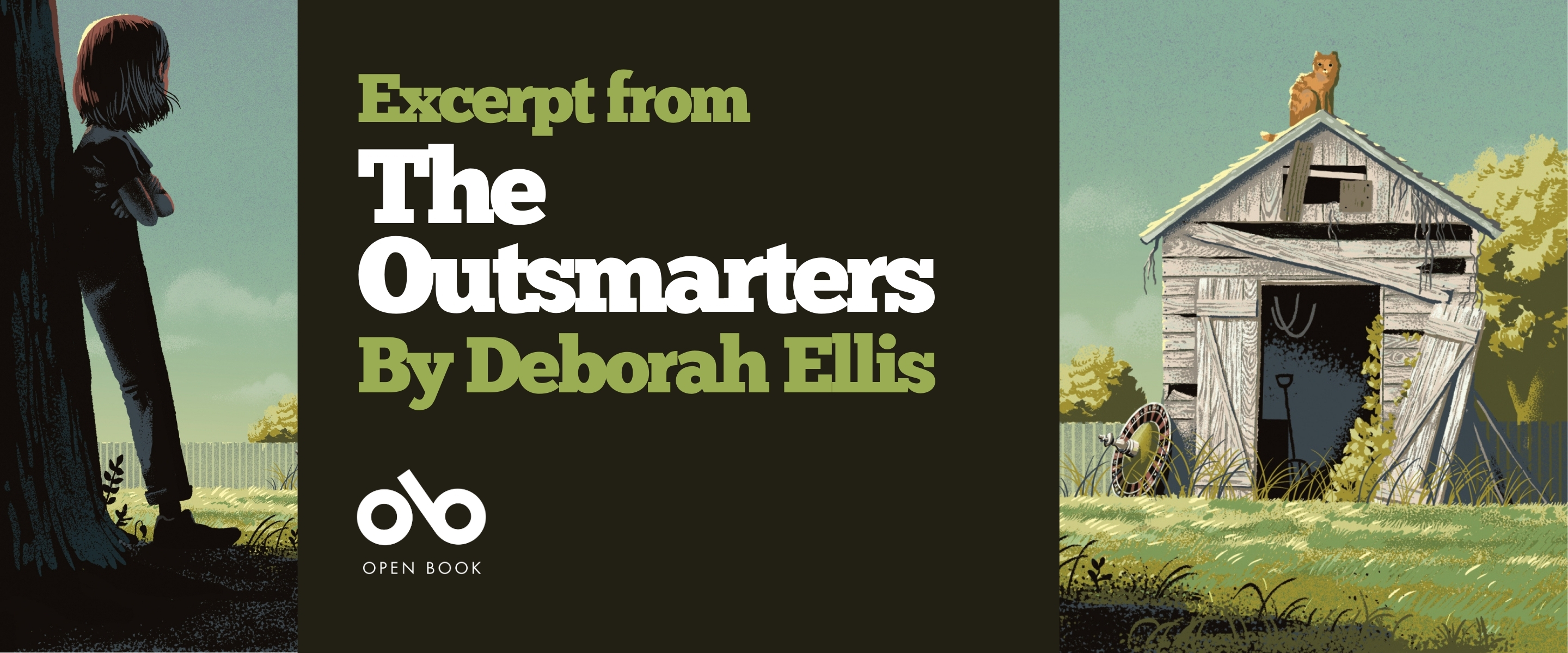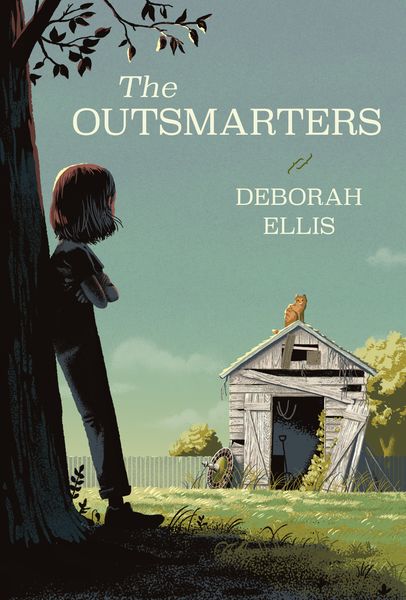Read an Excerpt from The Outsmarters by Deborah Ellis
Award-winning author, feminist, and peace activist Deborah Ellis is a prolific author of books for young people, and she is no stranger to conflict resolution and illustrating what it takes to overcome anger and frustration.
In the latest of her many acclaimed books, The Outsmarters (Groundwood Books), we follow twelve-year old Kate during a suspension from school. The girl is quick to lose her temper, has no friends, and is still reeling from her mother leaving her to be raised by her grandmother. It turns out that Kate's rages are hand-me-downs from the older woman, who likewise does not keep friends and was expelled from school for her own behavioural issues.
Kate knows that she needs to make money, in case her mother returns to take her away. When she brainstorms the idea of opening a psychiatric advice booth like Lucy in Peanuts, her grandmother dismisses the plan. So, instead, Kate sets up a philosophy booth to share sage answers for all of life's problems. This begins a journey into the world of adult problems and anxieties, and eventually Kate realizes that she has to look outside of her comfort zone, and her gran's stewardship, to find a way forward and put down her anger for good.
We've got an excellent excerpt from the very opening of The Outsmarters to share with our readers today, live and free on Open Book!
An Excerpt from The Outsmarters by Deborah Ellis
Chapter 1
“I don’t owe you a dime.”
Old Mrs. Cormon tries to close her front door, but my foot is in the way.
“You owe me for three hours of yard work,” I tell her. “You promised to pay me this time.”
“I did not! You’re just like your mother, always trying to get me to pay for Girl Guide cookies I didn’t order. And you’re just like your horrible grandmother. Edna! Calls herself Ed. Not a normal one in the whole bunch. Well, you live in junk, you are junk.”
She stomps her cane on my sneaker. I yank back my foot and she slams the door in my face.
Your CanLit News
Subscribe to Open Book’s newsletter to get local book events, literary content, writing tips, and more in your inbox
She acts all frail, but she can slam.
I stare at the closed door, and I start to shake.
Every cell in my body wants to tear her house apart. I want to shred her screens with my fingernails and rip up her welcome mat with my teeth. I want to smash her windows and shatter her light bulbs.
Old Lady Cormon is lucky I’ve learned to control my temper.
I make my brain make my legs step away. I plunk down on her top porch step and breathe deep. In and out. In and out. In and out. I uncurl my fists and open my palms to the summer air.
My nerves stop twitching. I look out at Mrs. Cormon’s fresh-mown lawn, at the cleaned-out gardens with the trimmed edges and at the sacks full of her yard waste.
I’m looking at three hours of work. My whole morning.
It would serve Mrs. Cormon right if I just open all those sacks and dump those weeds and leaves back on her yard.
But that would just mess up my good work. And it wouldn’t help me get paid.
I was supposed to get counseling after I was suspended from school, but the waiting list is almost a year. Gran and I looked in the Book Room at the Junk Yard and found an anger-management book from the l970s called Get Back to Groovy.
Groovy means our natural state of happiness. Whatever. The deep-breathing thing works.
I flash a peace sign like the book says to show the world that my bad vibes are gone, and I leave the porch feeling not full groovy but calmer. I load the sacks of yard waste into the push-pull cart Gran made me when I started my yard-cleaning business. The cart has a big garbage can on a frame with wheels. There are clamps to hold my tools.
I clip on the rake and put my work gloves and trowel in the old toolbox. The last thing to go on is the me-powered mower. Once that’s clamped on, I hit the road.
The neighborhood where we live and where Gran lets me work is in one of the oldest parts of town. The sidewalks are lopsided with tree roots. Every time my cart goes over a bump, sacks of weeds tumble to the ground.
It doesn’t help my mood.
I can’t show it, though. The street is full of my customers. They won’t want me to work for them if I have a meltdown right in front of them.
Walking by all the yards I’ve cleaned usually makes me feel proud, but today all I have room for is mad.
I’m mad at Mrs. Cormon for refusing to pay me, but I’m madder at myself. When I agreed to clean her yard again, I should have made her sign a contract like Gran suggested, but that seemed like too much work. I was lazy, and that cost me.
Gran is always saying, “We refuse to outmean them and we can never outspend them. We have to outsmart them.”
Today, Old Lady Cormon outsmarted me.
I like yard work. I like taking a mess of a garden and making it look good. Gran suggested this business after I got kicked out of school. It was my third suspension, which meant six weeks, and ran right to the end of the school year. I did the rest of sixth grade from worksheets they sent home with me, and Gran got me a seventh-grade workbook that I finished earlier this summer.
Even though Gran piled on the chores, I was still, in her words, “bouncing off the walls.” Cleaning people’s yards got me out of her hair and got her out of mine.
But yard work is hard work.
Not the work part. The people part.
To get a job, I have to knock on doors, smile and convince people to hire me. That’s not easy in our small town where everyone knows everything about everybody, especially the bad parts. And my mom and me have given them plenty of bad parts.
Once I have the job and do the work, I have to collect my pay.
Some customers are okay. They pay right away. One even brought me out a glass of water. I couldn’t accept it, though. Gran’s rules. I work only in front yards, I never go inside houses and I never take anything from anybody but money.
Other customers are awful.
One said she only had fifty-dollar bills. She made me come back three times before she finally threw ten dollars at me like she was tossing poison to a pigeon.
Some customers are picky about every blade of grass. Some ask me all about my life, which is none of their business. One man sat on his porch and just watched me while I worked. The whole time. Didn’t say a word. Gave me an extra ten dollars when I was finished. Maybe he didn’t have a library card, so he just sat and stared instead of reading a good book, but it creeped me out and I never went back there.
By the time I roll my cart into the Junk Yard, I am fed up with the whole yard-cleaning business.
Trouble is, I need money. I don’t get any from Gran. She says, “If you want to spend it, you have to earn it.”
I pull my cart through our parking lot, past the old shed that Gran keeps meaning to knock down, then out to the compost pile behind the old stable that is now Gran’s workshop. I empty the sacks of Old Lady Cormon’s yard waste onto the pile.
Near the compost pile is the firepit. Weeds have grown up around it and around the wooden benches Gran once built for it.
I used to live here with Mom when I was little. I have bits of memories of that firepit, of Mom and Gran with their guitars and toasting marshmallows and tossing little sticks into the flames.
There have been no bonfires since Mom’s been gone. No singing, either.
Gran owns the largest junk business in the tri-county area. The shop is gigantic. It’s a rambling old house on over an acre of in-town land. Gran’s great-greats tacked on additions this way and that. Some of our ancestors are buried on the property, in a little graveyard under a weeping willow. The five gravestones are very old and hard to read. We keep the grass trimmed around the graves, but since they don’t make us money, we don’t spend any more time on them than that.
Gran was a young woman when she inherited the house from her parents. It was full of stuff when Gran grew up in it and full of stuff when she inherited it — old furniture, rugs, ancient toys, closets full of pewter, silver, crystal, china and shelves of every kind of collection you can imagine. There are boxes full of stuff in the attic and down in the basement that Gran hasn’t even opened yet.
My great-greats were good at collecting and adding onto the house but not so good at repairs. When Gran became the owner, there were taxes owing, a furnace that didn’t work and a roof that leaked. Her plan was to sell the whole property and go back out west to art school. She didn’t like the house and she didn’t like the town.
She was about to sign the papers when her real-estate agent offered to buy one of the old lamps for fifty dollars.
Gran smelled a rat. She gave the real-estate guy the boot and did some research. That lamp was made by Tiffany and fetched her enough to repair the roof. She sold more things, paid the taxes and put in a new furnace. The Junk Yard was born.
Seven months after that, so was my mother.
My mother’s father was someone Gran met at art school.
“He was a lousy artist,” she told me once. “With his long hair and beard, he looked like Rasputin. What was I thinking?”
I found a picture of Rasputin in our Book Room. He was a monk with weird eyes from the Russian Revolution who had the czar and his family wrapped around his little finger. I don’t know what Gran was thinking, either.
She wrote to him about the baby. He sent the letter back, taped shut and marked Return to Sender. So much for him.
Gran and I live at the back of the shop, in a little sliver of the house Gran carved out for herself after she turned the place into a business.
Now I clean up, wolf down a piece of bread with peanut butter, then go through the door that connects the residence to the shop.
The Junk Yard shop is a maze of rooms, shelves and alcoves, but there is a direct line of sight from the residence door to Gran’s cash register.
Gran is arguing with a customer. I recognize him. He’s one of our regulars — a grumpy old man who collects pitchers. Collectors come to our shop for all kinds of things — buttons, iron doorstops, Depression glass, duck decoys. Gran has it all.
Pitcher Guy sees me, shuts up, pays up and goes.
“What does he do with all the pitchers he buys?” I ask Gran.
“Not my problem. If I have to put up with him in my shop, I’m going to take his money. All done with Mrs. Cormon?”
“Damn done,” I mutter.
Gran holds out her hand, palm up, and waggles her fingers at me.
“She refused to pay me again,” I say, ready for the lecture.
“Also not my problem,” says Gran. “You agreed to rent the lawn mower from me for two dollars a job. Why should I suffer if you can’t collect from your customers?”
I carry change in my pocket. I count out two dollars and hand it to her.
“You’re twelve years old, Kate,” Gran says, like I don’t know that. “You’re way too old to get swindled by the likes of Bitsy Cormon. She’s a horrible old woman.”
Takes one to know one, I think.
“She’s as dishonest now as she was when we were in school,” Gran continues. “She cheated your mother out of Girl Guide cookie money, too. I told you all that. You can’t say you didn’t know.”
Gran drops the coins into the ceramic bank she’s kept on that counter since before I was born. Customers put their change in it all the time. There’s a sign on it — Coffee Fund. Gran uses it for her Tim Horton’s runs.
The bank is shaped like Lucy from the Peanuts comic, sitting back with her feet up on her Psychiatric Help booth, looking very pleased with herself.
Of course Lucy is happy! Customers come to her and she just sits there! She doesn’t have to go looking for them. Everyone knows Lucy is crabby and they don’t expect her to be nice. And people pay her before she gives them advice. Their money is safely tucked away in her money tin and if they don’t like what she has to say, tough cookies.
The more I stare at ceramic Lucy and her easy money, the more jealous I get.
Then I kick my brain into gear and get a brilliant idea.
_______________________________________________
Deborah Ellis is the author of the international bestseller The Breadwinner, which has been published in twenty-five languages. She has won the Governor General’s Award, the Middle East Book Award, the Peter Pan Prize, the Jane Addams Children’s Book Award and the Vicky Metcalf Award. A recipient of the Order of Canada, Deborah has donated $2 million in royalties to organizations such as Women for Women in Afghanistan, UNICEF and Street Kids International. She lives in Simcoe, Ontario.






